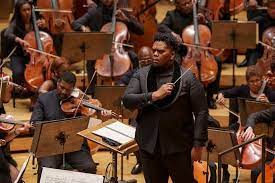by Mike Telin

Anthony Parnther will guest conduct the Cleveland Orchestra for its August 8 concert with John Legend at Blossom Music Center. I recently had the opportunity to speak with the multi-talented musician by telephone about his fascinating career.
Mike Telin: Where am I finding you?
Anthony Parnther: I’m in Baltimore. I’ve been in the middle of a couple of concerts with the Symphony.
MT: When does the tour with John Legend begin?
AP: I’m not sure it constitutes a tour per se. but it’s an array of dates around the country and in China. He’s on tour, but not all of his dates involve the full orchestra. Sometimes it’s just John on the piano by himself, sometimes it’s John with the band, and then sometimes he gets to use the entire orchestra. That began a month and a half ago with Wolf Trap. We were in San Francisco last weekend and we’ll be progressing on to Philadelphia and Cleveland next week.
MT: How did the gig come about?
AP: I’ve had a long relationship with the LA Phil and I was asked by them to premiere this particular show with the Hollywood Bowl Orchestra sometime last summer. Then I produced a show for a different artist who is a producer and rapper. John Legend was a part of that show, and it was at that time that I was asked to take the show that we had done at the Hollywood Bowl on the road.
I said that I’m already away for something like 30 weeks this year, so I didn’t think it would be possible, but I looked at the dates and somehow, magically, they just happened to all be on weeks that I could make it happen. So I was like, absolutely, I’m going to do this.
MT: What will audiences experience during the show?
AP: It’s a really well-crafted show, a retrospective of John Legend’s life and career. He has a deeply personal dialogue about his entire life and, who he was before audiences became familiar with him as John Legend. It’s a really beautiful show that delves into his upbringing, his musical endeavors, some very personal anecdotes about family, and then about love and the family that he’s created along the way. Some of the music is John’s, and some of the music is music that John was influenced or affected by. So it’s a combination of all those things, and it’s just really beautiful.
MT: You began as a bassoonist. I listened to your Libertango that you have online and loved it. How does one go from being a bassoonist to having a career like yours?
AP: Professionally speaking, I’ve always played and conducted simultaneously. I guess if somebody were to ask me what I did, I would tell them I was a musician, whether I was conducting on Monday or playing bassoon on Tuesday or orchestrating on Wednesday or teaching on Thursday. But I’ve always been interested in the complete sphere of music making, and conducting and playing is just one part of that. I find myself conducting mostly these days, but I’m still an active player. As soon as I get back to Los Angeles, I have a session for Star Trek.
The conductors I respect the most have remained active players. And I think to myself, if I’m going to tell somebody how to play an instrument, I have to be active myself.
MT: Is there any difference between conducting a recording session for a movie score and conducting a symphony?
AP: There are major differences between the two. When we’re doing a recording session for film and television, the composer is always 20 feet away. So the role of the conductor in a studio session is a little bit more of an administrator, you’re working with a composer, and a director, and you have a limited amount of time to get a work recorded. So you’re dealing with a budget of time.
You’re also dealing with organizing the score to maximize efficiency. You’ve got an 80 person orchestra, but not every cue calls for 80 people. So you’ve got to organize the score in such a way that you maximize things — you know, let people go who aren’t necessarily going to play on everything. You have to really do a lot of careful estimation on that.
And sometimes it’s not necessarily about your aesthetic as a conductor, it’s about the composer’s aesthetic. It’s a stressful environment because you’ve got a composer, an orchestrator, a music editor and directors and producers to contend with.
And in that booth I start hearing ten, fifteen different opinions at the same time going into my headphones, and it’s my job to sift through all of that and get the orchestra over the finish line as best as possible while managing the morale of the room very carefully.
MT: You also have your own orchestra with the San Bernardino Symphony. How does it feel to have yet another hat to wear?
AP: When you’re a music director for an orchestra, conducting is only 10% of the job. Being a music director really is about the hiring of musicians. Sometimes it’s a garden that has to be tended to, and sometimes it’s about civic appearances and forming alliances around the city.. There’s a great deal of fundraising and organization that must be done, and building a community trust, and coming up with programs that are meaningful to the community that you serve. And did I mention fundraising?
Its a demanding job for a relatively small regional orchestra. I am in contact with my executive director every day. So being the MVP of that little orchestra and trying to grow it is a 24-hour-a-day, 7-day-a-week kind of job. Conducting is the last tiny little bit.
Published on ClevelandClassical.com August 7, 2024.
Click here for a printable copy of this article



